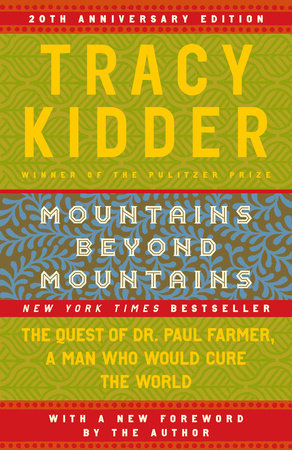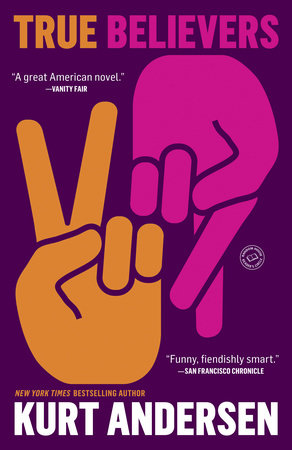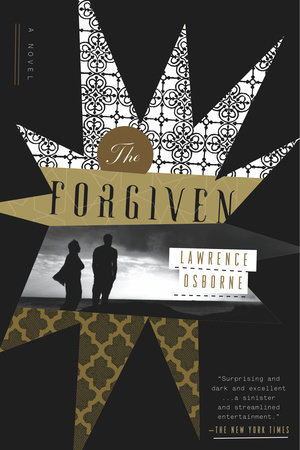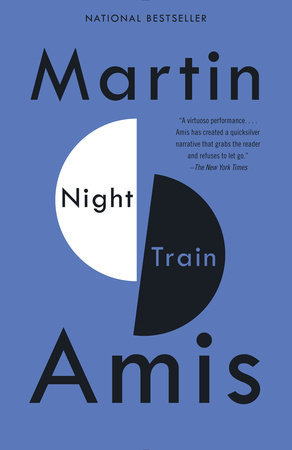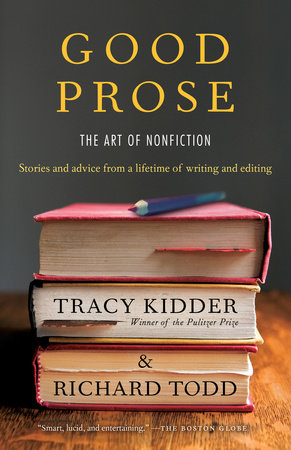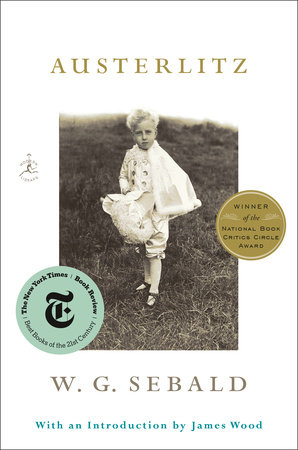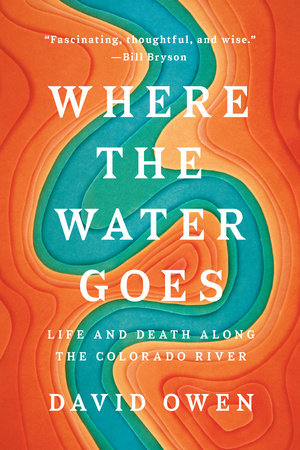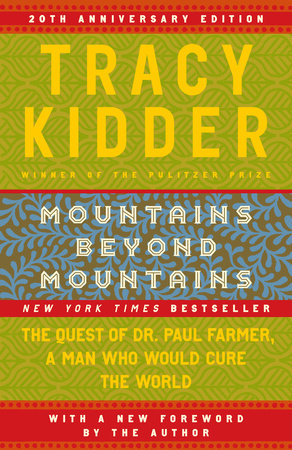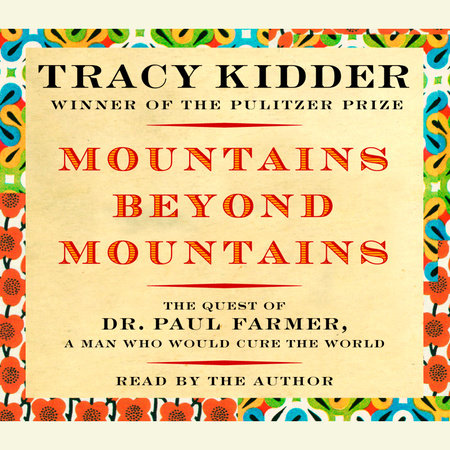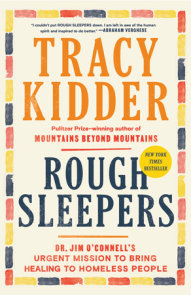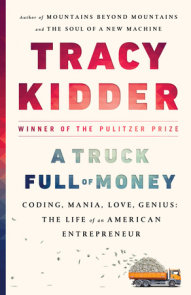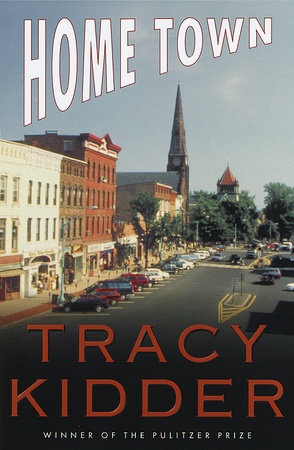Author Q&A
A Conversation with Tracy Kidder, author of MOUNTAINS BEYOND MOUNTAINS
Q: How did you meet Paul Farmer, and what made you want to write about him?
A: I met him in Haiti in 1994. I was doing a story on American soldiers sent there to reinstate the country’s democratically elected government. Farmer showed up one night at the barracks and got into an argument with the commander. I wasn’t very interested in him then, but a few weeks later I ran into him on the plane to Miami and I began to learn some of the outlines of his life, which I found very interesting. Farmer was the second of six children, and spent most of his childhood in Florida, the whole family living on a bus and a houseboat that was moored in a bayou on the Gulf Coast. He went to Duke on a full scholarship, and then, while he was earning his M.D. and Ph.D at Harvard, he conceived and helped to build an amazing health care system in one of the poorest corners of Haiti. Around the time when I met him, he and his small band of colleagues were about to go to war against the dominant ideologies in international health — eventually they’d actually win some significant battles.
And I was drawn to the man himself. He worked extraordinary hours. In fact, I don’t think he sleeps more than an hour or two most nights. Here was a person who seemed to be practicing more than he preached, who seemed to be living, as nearly as any human being can, without hypocrisy. A challenging person, the kind of person whose example can irritate you by making you feel you’ve never done anything as important, and yet, in his presence, those kinds of feelings tended to vanish. In the past, when I’d imagined a person with credentials like his, I’d imagined someone dour and self-righteous, but he was very friendly and irreverent, and quite funny. He seemed like someone I’d like to know, and I thought that if I did my job well, a reader would feel that way, too.
My favorite teacher once used to talk about how writers often have their best stories bestowed upon them, seemingly by accident. I felt as though, in meeting Farmer, I’d been offered a rare opportunity.
Q: What was Farmer’s initial response to your wanting to write a book about him and his work?
A: I think the idea made him uncomfortable. At any rate, it took him some months to make the decision. I can’t speak for him, but I think he agreed mainly because he was persuaded by some of his closest friends that a book about his life and work might bring attention both to the issues that he cares most about and also to the little organization that he helped to create — Partners In Health.
Q: What was involved in doing the research for this book?
A: A lot of time in airplanes. I traveled with Farmer to Haiti more times than I can now remember. I also went with him twice to Moscow, and to Siberia, to Peru, to Cuba, to Paris, to Chiapas in Mexico, to Montreal and New York City and, many times, to Boston. And I went to Geneva, Switzerland, with one of his closest colleagues.
I also visited his mother and some of his siblings, and the places of his childhood. I interviewed dozens of people. And I read a great deal, about medicine and public health, about the places where Farmer works, especially about Haiti.
Q: What does the title, MOUNTAINS BEYOND MOUNTAINS, mean?
A: The title comes from a Haitian proverb, which is usually translated as: “Beyond the mountains, more mountains.” According to Farmer, a better translation is: “Beyond mountains there are mountains.” I first heard the proverb from Farmer, and I remember that he told me, “The Haitians, of course, use it in a zillion different ways.” Sometimes it’s used to express the idea that opportunities are inexhaustible, and sometimes as a way of saying that when you surmount one great obstacle you merely gain a clear view of the next one. Of course, those two meanings aren’t inconsistent, and I meant to imply both in the title. To me, the phrase expresses something fundamental about the spirit and the scale and the difficulty of Farmer’s work. The Haitian proverb, by the way, is also a pretty accurate description of the topography of a lot of Haiti, certainly as I experienced it in my hikes with Farmer through the mountains of the central plateau.
Q: Farmer didn’t have a conventional upbringing. Tell us more about that. Do you think Farmer’s childhood was influential in the path he’s chosen?
A: Farmer’s father was a great big man, a ferociously competitive athelete nicknamed Elbows by people who played basketball with him, a sometime salesman and school teacher, with a lot of unconventional ideas and an absolutely pig-headed determination to have his family live by them. He took his family to a town north of Tampa, Florida, where for about five years they all lived in a bus in a campground. Then he took them to a bayou on the Gulf Coast where all eight of them lived in a leaky old 50 foot-long boat. As a boy, Farmer thrived in these unusual circumstances. He was a tall, skinny kid and he disappointed his father by not being much of an athelete, but he excelled in every intellectual department. He seems to have been precocious spiritually as well. At 11 he was given a copy of Tolkien’s Lord of the Rings, which he read and then immediately re-read in the space of a few days. Then he took it to the public library and said to the woman at the desk, “I want more books like this.” She gave him adventure and fantasy novels and he kept coming back and saying, “This isn’t it.” Finally, she gave him Tolstoy’s War and Peace, which he devoured, at the age of 11. It wasn’t adventure or fantasy that interested him; it was the epic struggle between good and evil. He didn’t have the words to say that then. Returning the library’s copy of War and Peace, he simply told the librarian, “This is it! This is just like Lord of the Rings.”
It was a childhood full of family adventures and misadventures and completely unconventional. Farmer himself didn’t like to make too much of the connections between his background and the life he chose. At the very least, though, that childhood was good preparation for a life of travel and doctoring in difficult places like Haiti. He emerged from living on a boat in a bayou with what he called a “very compliant GI system,” and from dinners of hot dog bean soup without much fussiness about food, and from years of cramped quarters with the ability to concentrate anywhere. He could sleep in a dentist’s chair, as he did at night for most of one summer in a clinic in Haiti, and consider it an improvement over other places he had slept, and I imagine that his fondness for a fine hotel and a good bottle of wine had the same origins.
There were other advantages, Farmer insisted. The kind of father who thought it reasonable to house his family in a bus, then a boat, was also the kind who saw no reason his son shouldn’t keep a large acquarium inside. Farmer insisted that he never really felt deprived throughout his childhood, though he did admit, “It was pretty strange.” After living through some of his father’s very public misadventures, it was hard to feel embarrassed or shy in front of anyone. He allowed that growing up as he did also probably relieved him of a homing instinct. “I never had a sense of a home town. It was, ‘This is my campground.’ Then I got to the bottom of the barrel, and it was ‘Oh, this is my hometown.’” He meant the central plateau of Haiti.
Q: In your travels with Farmer, what most surprised and interested you? Did you learn something from the experience?
A: The thing about travel with Farmer is that you don’t visit the brochure sights. His itinerary is pretty much restricted to visiting hospitals, slums, and prisons. The dreadful places of the world. I hadn’t imagined that there were so many of those, and I hadn’t known just how dreadful they were. But the trips weren’t dreary and depressing, because Farmer and his colleagues were doing something tangible, something meaningful, something that was actually improving those places. This was especially true in Haiti and Peru. I’d say that I learned two things above all. That medicine and public health are a powerful lens for looking at the world. And that a small group of determined people can actually alter some of the pictures seen through that lens. I think that as a very young man Farmer chose to work in one of the most impoverished parts of Haiti because he was moved by the suffering he saw there. But if he’d wanted to prove a point about what is possible in public health, he couldn’t have chosen a better site. If you can do a good thing in central Haiti, it stands to reason that you can do it anywhere. And what he and his friends have done and are doing in Haiti — and elsewhere – is nothing short of remarkable.
Q: Has your life or outlook about life changed as a result of spenind time with Farmer and writing this book?
A: One of my favorite characters in this book is a woman named Ophelia Dahl. She met Paul Farmer when she was 18 and he was 23. She told me that she remembered, from many years ago, deciding that Farmer was an important person to believe in. Not as a figure to watch from a distance, thinking, Oh, look, there is good in the world. Not as a comforting example, but the opposite. As proof that it was possible to put up a fight. As a goad to make others realize that if people could be kept from dying unnecessarily — from what Haitians call “stupid deaths” — then one had to act. I don’t plan to give away all my worldly goods and go to work with Farmer in Haiti. For one thing, I’d just get in the way. But I can’t tell myself anymore that the great problems of the world, such as the AIDS and TB epidemics, are beyond all hope of amelioration, or of repair. In other words, I don’t think I can feel comfortable anymore in this world, by resigning myself to despair on behalf of billions of other people. There’s always something one can do.
It’s not my place to make a fund-raising pitch for Farmer and his organization, Partners In Health. Well, actually, I don’t know why it isn’t my place. I happened onto something remarkable and I sat down to try to describe it to others. I hope what I’ve written is artful. I believe it is at least accurate and truthful. And one true fact is that Farmer’s organization, Partners In Health, represents a real antidote to despair. A person with a little money to give away can send it to Partners In Health and be certain that it will be used well. 95 percent of the money that’s donated to Partners In Health goes to pay for direct services to people who are both desitute and sick — in Boston, in Russia, in Chiapas, in Peru, and especially in Haiti, where the poorest and the sickest people in our hemisphere reside. A donation to Partners In Health of, say, $200 will save an impoverished Haitian from dying a horrible death from tuberculosis.
Q: How does this book differ from your other projects?
A: Well, for one thing this book has a pretty large geographical spread, whereas all my previous books are set in New England. And all the others are about what might be called “ordinary people.” Of course, no one is ordinary. But Farmer is less ordinary than anyone I’ve ever met. This is the main reason I wrote this book in the first person, something I’d done in only one other book. After I’d spent a lot of time with Farmer, I began to feel that altruism was plausible after all, indeed maybe even normal. But the sacrifices he’s made aren’t usual, and I knew that readers of my book would need an everyman, someone a lot less virtuous than Farmer, to interpret him and to make him believable. Someone to testify, in effect, that this guy is for real, and someone who could register the occasional discomfort that anyone would feel in such a person’s company. Finally, although I like to think that the subjects I’ve written about in my other books are important, I don’t think there’s much question but that the subject of this book is more important. After all, what it’s about at bottom is the attempt of one small group of people to heal a sick world.
Q: Farmer doesn’t work alone. He is surrounded by some extraordinary people. Can you tell us a little about some of them?
A: There are more than a thousand people working for Partners In Health these days. They range from Haitian peasants who have been trained as community health workers to extremely bright young American epidemiologists, medical students, and doctors, who have enlisted to work in places such as central Haiti and Siberia and the slums of Lima, Peru – some of them work for nothing, some earn much less than they could elsewhere and some raise their own salaries through grants. Ophelia Dahl has been involved in Farmer’s work from the start, and she’s a crucial member of Partners In Health, the manager, the peacekeeper. She’s a warm and charming person, and she knows how to manage Farmer and Farmer’s colleague, Jim Yong Kim. Kim is, like Farmer, a Brigham doctor. He joined up only a few months after Partners In Health was founded. He’s brilliant, an inspiring speaker, a fountain of ideas, and indefatigable.
Finally, and maybe most important, there’s a man named Tom White. He built a small family business into one of the largest heavy construction firms in Boston. He and Farmer met when Farmer was still a doctor in training. He founded Partners In Health along with Farmer and until recently provided most of the money for its projects, millions and millions of dollars over the past 20 years. White is in his eighties now, and has given away almost all of his large fortune. He told me once, “Sometimes I think how much money I used to have before I met Paul and Jim. But that’s all right. If I go to a restaurant and they give me a steak, I can only eat half of it anymore.” He plans, he told me, to leave this life without a nickel. I think it’s accurate to say that White has lifted death sentences from thousands of people, and the organization, the movement, that he helped to start may in the end save millions.
###
